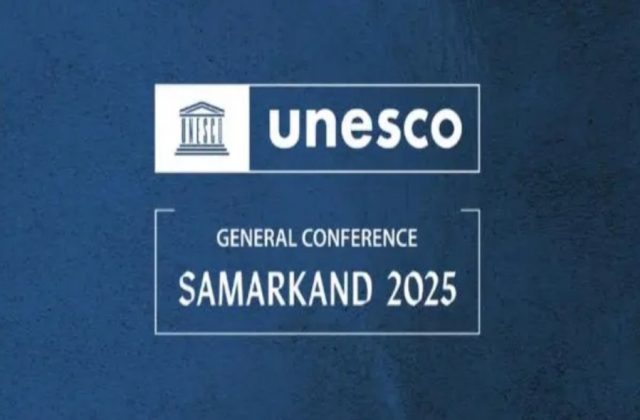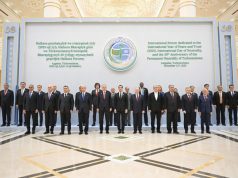A milestone for global cultural diplomacy and a testament to Uzbekistan’s growing international stature
SAMARKAND, Wednesday, October 22, 2025 (WNP): The 42nd session of the UNESCO General Conference, held in Paris from November 7 to 22, 2023, unanimously adopted a resolution to convene its next session – the 43rd General Conference – in Samarkand, Uzbekistan, in 2025 in a landmark decision reflecting Uzbekistan’s rising global profile.
This decision, supported by all 194 Member States, marks the first time in four decades that the UNESCO General Conference will be hosted outside Paris, underscoring international recognition of Uzbekistan’s sweeping reforms in culture, education, science, and heritage preservation.
Uzbek President Shavkat Mirziyoyev hailed the development as a “historic achievement” and extended gratitude to UNESCO and all supporting nations.
“This global event, being held in our region for the first time, will highlight the vast civilizational potential of Uzbekistan and Central Asia. We will mobilize all our efforts to ensure its successful organization,” President Mirziyoyev said.
Samarkand — one of Central Asia’s oldest cities and a UNESCO World Heritage Site — was chosen for its cultural symbolism and deep historical legacy. Once a vibrant hub on the Great Silk Road, linking East and West, Samarkand today remains celebrated for landmarks such as Registan Square, the Ulugh Beg Observatory, and Shah-i-Zinda necropolis — each embodying centuries of scientific advancement and artistic excellence.
The 43rd session is expected to draw over 5,000 delegates from 194 countries, including heads of state, ministers, and leading experts in education, science, and culture.
Following the Paris announcement, President Mirziyoyev issued a special decree on March 16, 2024, establishing an Organizing Committee to oversee logistics, coordination, and protocol for the event. Preparations include streamlining visa facilitation, transportation and health services, and cultural programming in close coordination with UNESCO.
Ahead of the main conference, Samarkand will also host the 14th UNESCO Youth Forum and the 12th Interregional Meeting of National Commissions for UNESCO, further positioning the city as a global dialogue center.
The upcoming General Conference will feature sessions on artificial intelligence in museums, gender equality, and women’s empowerment, among other critical issues. Uzbekistan, in partnership with UNESCO, is also advancing new initiatives on AI ethics, digital education, and sustainable tourism along the Silk Road.
UNESCO Director-General Audrey Azoulay, in her meeting with President Mirziyoyev in Paris earlier this year, praised Uzbekistan’s proactive engagement, describing the preparations as “an exemplary model of international cooperation.”
Uzbekistan’s relationship with UNESCO spans over 30 years since joining the organization in 1993. The country currently boasts seven sites on the World Heritage List, including Samarkand’s “Crossroad of Cultures,” Bukhara, and Khiva’s Itchan Kala.
Additionally, 16 elements of Uzbekistan’s living traditions — such as Shashmaqam music, Nowruz celebrations, Pilaf culture, and Lazgi dance — are inscribed on UNESCO’s Intangible Cultural Heritage List.
In 2023, Uzbekistan also established the UNESCO–Uzbekistan International Prize named after Abu Rayhan al-Biruni, recognizing excellence in the ethical use of artificial intelligence — a symbolic bridge between the country’s scientific legacy and modern innovation.
Sara Noshadi, Head of the UNESCO Representative Office in Uzbekistan, described the decision as “an extraordinary milestone” for both the country and UNESCO.
“For the first time in 40 years, the General Conference will not take place in Paris but in Samarkand — a city at the heart of global civilization. Uzbekistan’s bold reforms since 2016 have drawn the world’s attention, particularly in education, culture, and science,” she said.
Experts view Samarkand’s selection as not only a recognition of Uzbekistan’s achievements but also as a revival of Central Asia’s role as a historic meeting point for civilizations — a message of peace, knowledge exchange, and cultural solidarity at a time of rising global polarization.
As the world prepares for the Samarkand 2025 UNESCO General Conference, the event is expected to serve as more than just a policy platform — it will symbolize the enduring values of cultural preservation, dialogue, and cooperation.
In hosting this historic gathering, Uzbekistan is set to reaffirm its position as a modern hub of diplomacy, culture, and science, bridging continents and fostering the global spirit of the Silk Road once again.




